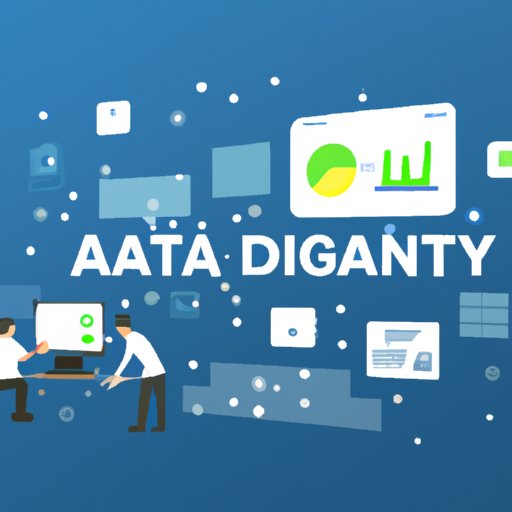Introduction
Data analysis is the process of collecting and analyzing data to gain insights and make informed decisions. In the modern business world, data analysts play an important role in helping organizations understand their data and make decisions based on it. With the rise of artificial intelligence (AI), however, some are questioning whether data analysts will be replaced by machines. This article aims to explore the potential for AI to take over data analyst jobs, and discuss the implications for organizations.

Impact on Organizations if AI Replaces Data Analysts
If AI is able to successfully replace data analysts, there are a number of potential benefits for organizations. The most obvious of these is cost savings. AI can automate many of the tasks that data analysts would have to do manually, reducing the need for human labor and allowing companies to save money. Additionally, AI can improve efficiency, since it can process large amounts of data quickly and accurately, and can often outperform humans in terms of speed and precision.
AI can also improve accuracy. By relying on machine learning algorithms and predictive analytics, AI can analyze data more accurately than humans, leading to better decision-making. Finally, AI can help organizations stay ahead of the competition, as it can identify trends and patterns in data that may not be immediately apparent to humans.

Examining the Limitations of AI in Replacing Data Analysts
While AI has the potential to replace data analysts, there are a number of limitations to consider. One of the most significant is the lack of human insight. AI may be able to process data quickly and accurately, but it lacks the creative problem solving skills that humans possess. Additionally, AI can struggle to adapt to changing conditions, which can be a major issue when dealing with dynamic data sets.
Finally, AI can produce unpredictable outcomes. While AI can identify patterns in data, it can sometimes make decisions that are difficult to explain or justify. As a result, organizations must be prepared to accept the risk of unexpected outcomes when relying on AI for data analysis.

Assessing the Pros and Cons of AI Taking Over Data Analyst Jobs
When considering the potential for AI to replace data analysts, it is important to weigh both the pros and cons. On the one hand, there are a number of potential benefits. For example, AI can reduce labor costs since it does not require salaries or benefits. Additionally, AI can increase speed and precision, and can even handle complex tasks that would be too time consuming for humans.
On the other hand, there are also several drawbacks to consider. Most notably, AI can lead to the loss of human insight, since machines lack the ability to think creatively. Additionally, AI can produce unpredictable results, and can struggle to adapt to changing conditions. As a result, organizations must carefully weigh the pros and cons before deciding whether or not to use AI for data analysis.
Understanding the Impact of AI on the Future of Data Analysis
It is clear that AI is becoming increasingly popular, and it is likely to continue to grow in popularity in the coming years. This means that organizations will need to be prepared for the possibility of AI taking over data analyst jobs. However, this does not mean that data analysts will become obsolete. Instead, the role of data scientists is likely to become increasingly important, as they will be responsible for combining human and machine learning to make the most of the available data.
Conclusion
This article has explored the potential for AI to replace data analysts in organizations. It has discussed the pros and cons of such a move, as well as the implications for data analysis in the future. Overall, while AI has the potential to reduce costs and improve efficiency, it also has its limitations, and organizations must carefully weigh the pros and cons before making any decisions. Ultimately, AI is likely to become increasingly popular, and data scientists will play an important role in combining human and machine learning to make the most of the available data.
(Note: Is this article not meeting your expectations? Do you have knowledge or insights to share? Unlock new opportunities and expand your reach by joining our authors team. Click Registration to join us and share your expertise with our readers.)
